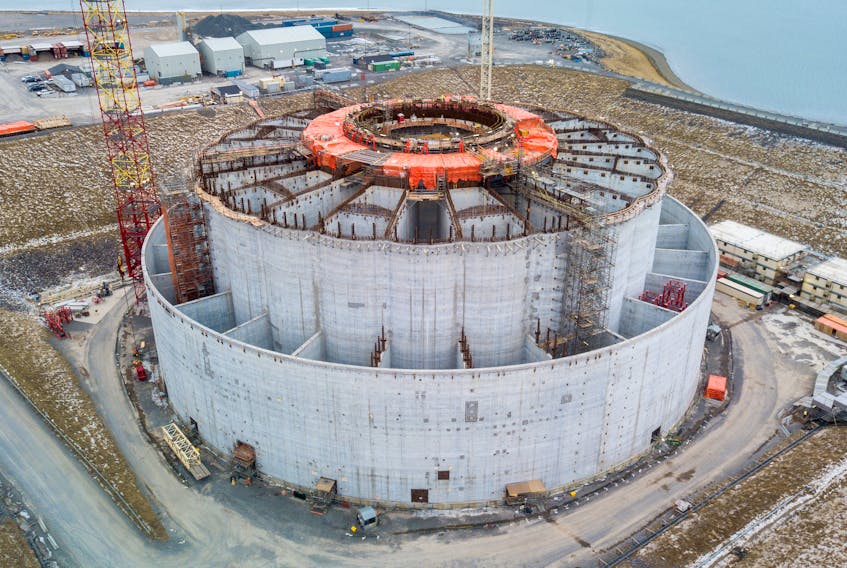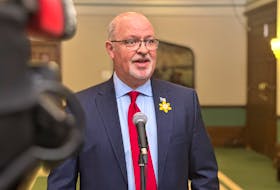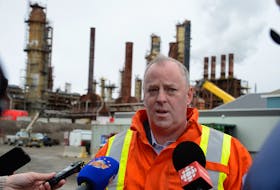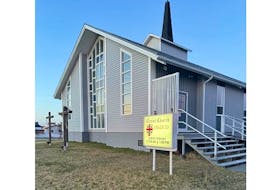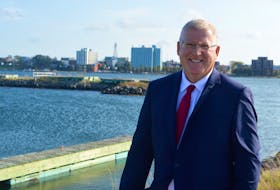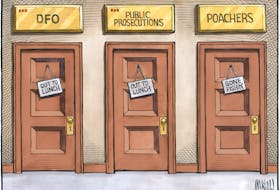ST. JOHN'S, N.L. — Construction work in 2021 on Newfoundland and Labrador's beleaguered West White Rose offshore oil project is officially not happening, and what occurs beyond then will likely depend on a new owner's assessment of the economic landscape.
Dual pieces of news shook the province on Sunday and Monday regarding the project. On Sunday, Husky and Cenovus Energy jointly announced a deal that will see the latter company buy Husky in an all-stock transaction valued at $3.8 billion. All of Husky's operations will be merged under the Cenovus brand once the transaction is completed. A news release issued Sunday said that will likely happen in the first quarter of 2021.
In response to questions from The Telegram about the project's future in light of Sunday's announcement, a Husky spokeswoman confirmed Monday the company's immediate plans.
"Following our review, Husky has cancelled the 2021 (West White Rose) construction season. However, we continue to work with the government to discuss how the federal dollars allocated to the offshore can support the long-term success of White Rose and the offshore, including determining whether some scopes of work can proceed and help position the project for restart when commodity prices recover," the spokeswoman said.
Review process
Husky initiated its review in early September, almost six months after construction activity at sites in Argentia and Marystown was suspended because of the COVID-19 pandemic. The spokeswoman said both companies will continue to operate as separate entities until the transaction closes. Once that happens, Cenovus will conduct a new review of all assets to determine how to best proceed from a business perspective.
"Regarding Husky's Newfoundland and Labrador operations, the (West White Rose) project is key to extending the life of the White Rose field. As we have said before, all options are on the table and accelerating abandonment remains a possibility," she added.
Cenovus executive vice-president and chief financial officer John McKenzie also discussed the move in a conference call held Sunday regarding the transaction. He said investment will focus on assets that offer high capital returns and promote efficiency.
"When we think about this going forward, things like West White Rose, we're not investing in 2021 — that's something that's going to be on delay," he said.
Construction work for the West White Rose project — much of it centred around the concrete gravity structure in Argentia — is valued at $2.2 billion. That work was about 60 per cent complete as of mid-March, when construction was suspended.
Since then, oil and gas commodity prices have stumbled. Decreased demand for petroleum is also hurting North Atlantic's oil refinery in Come By Chance. It has not reopened since a mid-March shutdown, and a deal announced in May for Irving to purchase the refinery recently fell apart.
Big project
Located in the Jeanne d'Arc Basin, approximately 350 kilometres east of the island, the West White Rose project would have expected peak capacity of 75,000 barrels of oil per day, producing light crude oil.
As of early September, Husky employed 500 operations staff in Newfoundland and Labrador, with an unspecified number of those workers laid off earlier this month. West White Rose was expected to create an additional 250 full-time positions. Construction work for the project created 1,000 unionized jobs.
The province was due to receive $3 billion in royalties and taxes as a result of the project. Through Crown corporation Nalcor Energy, Newfoundland and Labrador is one of three project proponents, alongside Suncor Energy and the project lead Husky. The company was encouraging the federal government to commit to an equity stake in West White Rose, but the government was unwilling to do so.
A month ago, the federal government announced a $320-million fund to support Newfoundland and Labrador’s oil and gas industry. A provincial task force is determining how to best use those funds. It’s due to offer initial recommendations on eligibility parameters and prioritization criteria next month. Recommendations for immediate action to the provincial Oil and Gas Industry Development Council are due no later than mid-January 2021.
Cenovus and Husky Combine to Create a Resilient Integrated Energy Leaderhttps://t.co/efjl4drgMz#HuskyEnergy pic.twitter.com/decQjBBD9L
— Husky Energy (@HuskyEnergy) October 25, 2020
Reducing risk
News of the Cenovus-Husky deal comes on the heels of a similar transaction announced this fall within the industry. Big deals announced earlier this month in the United States include plans for ConocoPhillips to buy Concho Resources Inc. for $9.7 billion and Chevron Corp. purchasing Noble Energy for $4.2 billion.
Chris Blumas, vice-president and portfolio manager of GlobeInvest Capital Management in Toronto, follows Cenovus closely and sees Sunday's purchase announcement as one that's very similar to the deals announced in the U.S., as they are all cashless transactions. In the midst of an uncertain business climate, these deals reduce risk, Blumas says.
"I think they're truly a statement that if oil stays lower for longer, then companies are preparing for a difficult time in the environment," he said. "I think that's their main driving force, the realization that oil prices are likely going to stay lower for longer over the medium-term, say the next 18 months to two years.
"The deal logic in almost all of them is very, very similar. You get a better diversification on your asset base. You get greater scales and can take costs out. And even in a more difficult environment, you can generate more robust cash flows and hopefully optimize your balance sheet at lower leverage. … It wasn't a shocking deal from that point of view. You achieve a few different things. In many ways, you lower risk."

Blumas said the push to become bigger can ultimately lower costs and enhance a company's financial profile.
According to a Postmedia story published Monday, a Cenovus spokesman confirmed the company will realize $600 million in operating and corporate cost reductions as a result of the transaction, with workforce reductions accounting for a "significant portion" of that figure.
As for capital projects, Blumas said energy companies are attempting to appeal to investors at a time when they're out of favour from an environmental perspective.
"Canadian energy companies, I've never seen in my career as much negative sentiment surrounding energy producers," he said.
Nevertheless, he says Cenovus has some excellent assets, citing its Christina Lake oilsands project as a prime example.
"I think in terms of capital projects going forward, it's going to be a lot tougher to justify any capital projects in this environment, but what the deal does is gives (Cenovus) a portfolio where they can look across, similar to what CNQ (Canadian Natural Resources Ltd.) does. CNQ has a whole range of assets, from oil to gas. They can look at this point in time — what's the best capital allocation decision."
— With files from Postmedia and Reuters
Andrew Robinson is the business reporter for The Telegram

